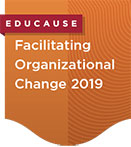Agenda
Course Activity and Digital Badge
Each registered participant will develop one activity that employs various concepts and strategies introduced in the course. Participants will be asked to complete assignments between the course segments that support the learning objectives and will receive feedback and constructive critique from the facilitators on how to improve and shape their work. Participants who successfully complete the entire activity will receive an EDUCAUSE digital badge recognizing their accomplishment.
Schedule and Activities
Session 1: What’s Going On Here—and How Do We Know? The Importance of Not Jumping to Solutions
Wednesday, September 4, 2019, 1:00–2:30 p.m. ET
"The ability to thrive in a fast-paced work environment" routinely appears in job postings. Yet "thinking fast" in every situation will inevitably lead to error at some point and is detrimental to a genuine understanding of what is going on in your institution or practice. "Thinking slow" to investigate a problem of practice need not take an inordinate amount of time, with the right tools, mindset, and common language. In this session, we will examine how to use a series of techniques to identify performance gaps, analyze root causes, discover systems contexts, and separate problem statements from solutions. (Hint: A lack of training is not the problem.)
Session Activity:
You will examine diagnostic tools and share how they might be applied to understanding a problem of practice at your institution.
Session 2: Should Something Be Done About It? (If So, What’s the Plan?)
Wednesday, September 11, 2019, 1:00–2:30 p.m. ET
Having come to an understanding of what is going on, what should happen next? Generating potential ways to address root causes is a first but insufficient step to move forward. Although an implementation plan is rarely perfect, it is essential at this stage to know if an intervention or solution, once implemented, matters and to understand why. Logic models help align project components and communicate interventions and improvement initiatives to stakeholders.
Session Activity:
You’ll examine key elements of potential action plans, including methods for gathering evidence and how to construct a logic model.
Session 3: The So-What Factor: Did the Change Make a Difference?
Wednesday, September 18, 2019, 1:00–2:30 p.m. ET
If an inquiry cycle were simply a matter of pre- and postintervention testing, it would be a weak quantitative experiment rather than an inquiry project. With a well-designed action plan, process analysis in an inquiry cycle is ongoing during implementation and tells the story of what happened; critical success factors are measured during and after the cycle; and overall findings inform further collaborative iteration and action planning. The process is both rigorous and commonsensical.
Session Activity:
You’ll review a completed inquiry cycle and determine strengths and limitations in preparation for planning your own inquiry.
